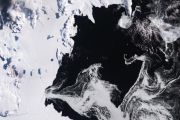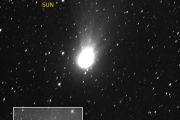
Copernical Team
Scalable lunar power study launched by Honda and Astrobotic
 Honda Motor Co. and Astrobotic Technology have entered a joint development agreement to investigate scalable lunar power solutions that combine Honda's regenerative fuel cell (RFC) system with Astrobotic's Vertical Solar Array Technology (VSAT) and LunaGrid service. The collaboration aims to deliver continuous and reliable power for extended lunar surface operations, particularly during the two-
Honda Motor Co. and Astrobotic Technology have entered a joint development agreement to investigate scalable lunar power solutions that combine Honda's regenerative fuel cell (RFC) system with Astrobotic's Vertical Solar Array Technology (VSAT) and LunaGrid service. The collaboration aims to deliver continuous and reliable power for extended lunar surface operations, particularly during the two- Moonquakes drive most new lunar landslides since 2009
 A Chinese-led research team has identified 41 new landslides on the Moon since 2009, concluding that endogenic moonquakes, not fresh impacts, are the primary trigger. The finding redefines understanding of active surface processes and highlights geohazard risks for future lunar bases.
For decades, scientists debated whether lunar landslides stem mainly from internal seismic activity, impac
A Chinese-led research team has identified 41 new landslides on the Moon since 2009, concluding that endogenic moonquakes, not fresh impacts, are the primary trigger. The finding redefines understanding of active surface processes and highlights geohazard risks for future lunar bases.
For decades, scientists debated whether lunar landslides stem mainly from internal seismic activity, impac Moon rock study reshapes timeline of ancient lunar impacts
 When Apollo 17 astronauts returned with lunar rock sample 76535, they unknowingly carried back a fragment that would continue to puzzle scientists for decades. The rock formed nearly 50 kilometers below the Moon's surface yet shows little evidence of the violent shocks expected from such depths.
Many researchers assumed it was excavated by the colossal impact that created the South Pole-Ai
When Apollo 17 astronauts returned with lunar rock sample 76535, they unknowingly carried back a fragment that would continue to puzzle scientists for decades. The rock formed nearly 50 kilometers below the Moon's surface yet shows little evidence of the violent shocks expected from such depths.
Many researchers assumed it was excavated by the colossal impact that created the South Pole-Ai Lunar Challenge Winner Tests Technology in NASA Thermal Vacuum Chamber
 One year after winning second place in NASA's Break the Ice Lunar Challenge, members of the small business Starpath visited NASA's Marshall Space Flight Center in Huntsville, Alabama, as part of their prize opportunity to test their upgraded lunar regolith excavation and transportation rover in the center's 20-foot thermal vacuum chamber.
The technology startup headquartered in Hawthorne,
One year after winning second place in NASA's Break the Ice Lunar Challenge, members of the small business Starpath visited NASA's Marshall Space Flight Center in Huntsville, Alabama, as part of their prize opportunity to test their upgraded lunar regolith excavation and transportation rover in the center's 20-foot thermal vacuum chamber.
The technology startup headquartered in Hawthorne, Chinese study suggests excess argon in lunar soil may come from Earth wind
 Chinese researchers have proposed that surplus argon-40 detected in lunar soil may originate from a stream of particles escaping Earth's atmosphere, a process they describe as Earth wind. The work, led by the Northwest Institute of Eco-environment and Resources (NIEER) under the Chinese Academy of Sciences, was published in the planetary science journal Icarus.
Argon, a noble gas found in
Chinese researchers have proposed that surplus argon-40 detected in lunar soil may originate from a stream of particles escaping Earth's atmosphere, a process they describe as Earth wind. The work, led by the Northwest Institute of Eco-environment and Resources (NIEER) under the Chinese Academy of Sciences, was published in the planetary science journal Icarus.
Argon, a noble gas found in Blue Origin teams with Luxembourg on Oasis 1 lunar resource mapping mission
 Blue Origin has announced Project Oasis, a multi-phase campaign to identify and utilize lunar resources. The first mission, Oasis-1, will work with Luxembourg partners to produce the most detailed orbital maps yet of water ice, Helium-3, radionuclides, rare earth elements, and precious metals across the lunar surface.
Oasis-1 will use neutron spectroscopy at ultra-low orbital altitudes to
Blue Origin has announced Project Oasis, a multi-phase campaign to identify and utilize lunar resources. The first mission, Oasis-1, will work with Luxembourg partners to produce the most detailed orbital maps yet of water ice, Helium-3, radionuclides, rare earth elements, and precious metals across the lunar surface.
Oasis-1 will use neutron spectroscopy at ultra-low orbital altitudes to Rocket Lab Expands Synspective Partnership with 10 Additional Electron Launches
 Rocket Lab has signed a new agreement with Japanese Synthetic Aperture Radar (SAR) satellite operator Synspective for 10 more dedicated Electron launches. The deal brings the total number of contracted Electron missions for Synspective to 21, marking the largest single-customer order in Rocket Lab's history.
The latest contract follows a June 2024 agreement for multiple launches, underscor
Rocket Lab has signed a new agreement with Japanese Synthetic Aperture Radar (SAR) satellite operator Synspective for 10 more dedicated Electron launches. The deal brings the total number of contracted Electron missions for Synspective to 21, marking the largest single-customer order in Rocket Lab's history.
The latest contract follows a June 2024 agreement for multiple launches, underscor Germany pledges EUR35 bn for space defence against Russia, China
 Germany will spend 35 billion euros ($41 billion) on outer space defence by 2030, Defence Minister Boris Pistorius said Thursday, citing the threat posed by Russia and China.
"Russia and China have in recent years rapidly expanded their capabilities for conducting warfare in space," he said.
"They can disrupt, jam, manipulate or even physically destroy satellites. In space, there are n
Germany will spend 35 billion euros ($41 billion) on outer space defence by 2030, Defence Minister Boris Pistorius said Thursday, citing the threat posed by Russia and China.
"Russia and China have in recent years rapidly expanded their capabilities for conducting warfare in space," he said.
"They can disrupt, jam, manipulate or even physically destroy satellites. In space, there are n Maintaining US space dominance requires rapid and reliable delivery of new systems
 Winning in space depends on accelerating the way capabilities are developed and delivered, Chief of Space Operations Gen. Chance Saltzman told thousands attending the Air, Space and Cyber Conference on Sept. 23. He emphasized that future superiority hinges on force design, system acquisition, and delivering tools Guardians can employ immediately.
Saltzman cited recent progress in GPS accur
Winning in space depends on accelerating the way capabilities are developed and delivered, Chief of Space Operations Gen. Chance Saltzman told thousands attending the Air, Space and Cyber Conference on Sept. 23. He emphasized that future superiority hinges on force design, system acquisition, and delivering tools Guardians can employ immediately.
Saltzman cited recent progress in GPS accur Sierra Space Dream Chaser's NASA deal upended, 1st flight pushed to late 2026
This request seems a bit unusual, so we need to confirm that you're human. Please press and hold the button until it turns completely green. Thank you for your cooperation!
Press and hold the button
If you believe this is an error, please contact our support team.
185.132.36.159 : 71d8a413-d797-410f-b3d8-e255ed82
































